Anxiety & Depression can be Related to Poor Nutrient Status and Other Health Markers
 Are you doing everything you can do to avoid mood busters such as anxiety and depression? Did you know that research shows a clear connection between certain nutrients, such as vitamin D and omega-3s, and your mood?
Are you doing everything you can do to avoid mood busters such as anxiety and depression? Did you know that research shows a clear connection between certain nutrients, such as vitamin D and omega-3s, and your mood?
Review the research below and take steps to ensure healthy levels of these nutrients and other health markers for YOU.
Research Supports Healthy Levels of the Following to Help Fight Anxiety & Depression
VITAMIN D
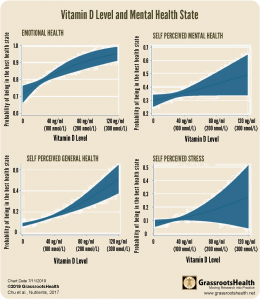 Vitamin D is biologically linked to emotional well-being, mood, cognition, and better mental health overall. It
Vitamin D is biologically linked to emotional well-being, mood, cognition, and better mental health overall. It
- plays an essential role in the health of the brain and nervous system, and has been shown to have beneficial effects on depression, stress, anxiety and sleep
- can improve self-perceived measurements of mental and emotional wellness; improvements have been positively associated with higher vitamin D levels
- in combination with omega-3s, can contribute to especially significant improvements in depression, anxiety, stress, and sleep scores; one study showed those supplementing with both experienced the greatest improvements in depression, anxiety, stress, and sleep scores at the end of the study compared to all other groups, meaning supplementing with both vitamin D and omega-3s had a greater effect on anxiety, stress, and sleep than either on its own or placebo
OMEGA-3S
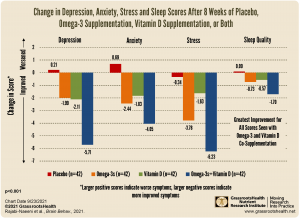 Approximately 8% of the brain’s weight is comprised of omega-3 fatty acids. These fatty acids are found within the neural membranes to help with key brain function and protecting from oxidative stress, inflammation, and cumulative destruction. EPA and DHA, two especially important omega-3 fatty acids, play a key role in several aspects of brain health;
Approximately 8% of the brain’s weight is comprised of omega-3 fatty acids. These fatty acids are found within the neural membranes to help with key brain function and protecting from oxidative stress, inflammation, and cumulative destruction. EPA and DHA, two especially important omega-3 fatty acids, play a key role in several aspects of brain health;
- the world’s largest review (called a meta-synthesis) of nutrient supplements and mental disorders showed that omega-3s (with an average dose of 1422 mg/day of EPA) reduced symptoms of major depressive disorder with benefits beyond those of taking antidepressants alone; the strongest effect was seen with omega-3 supplements that contained at least 50% EPA
- another meta-analysis found that clinical anxiety symptoms were more likely to improve among those who took omega-3 supplements versus placebo; the greatest effect was seen for those taking at least 2,000 mg per day of omega-3 fatty acids (at least 60% EPA)
MAGNESIUM
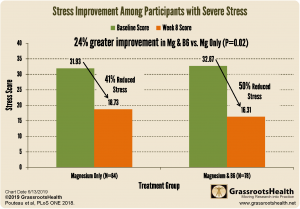 Magnesium is another nutrient that seems to have a major effect on stress, in part due to its role in the operation of over 300 enzymes. Research has shown that magnesium
Magnesium is another nutrient that seems to have a major effect on stress, in part due to its role in the operation of over 300 enzymes. Research has shown that magnesium
- supplementation helped improve depression and anxiety symptoms within two weeks, with significant improvement, whereas no improvement was seen in those without magnesium supplementation
- among individuals with moderate to severe stress, treatment with magnesium demonstrated rapid and significant reductions in stress with a 24% greater improvement in stress in those receiving magnesium with vitamin B6 (for those who had severe or extremely severe stress)
ZINC (and the COPPER:ZINC RATIO)
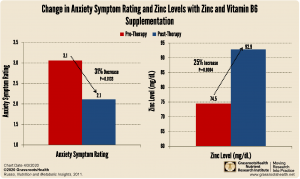 Zinc has been labeled as one of the most important trace elements in the body and is an essential nutrient for the proper function of many physiological processes, including neurological functioning. Zinc has protective effects against DNA damage and oxidative stress, which have been correlated with anxiety. Studies have found
Zinc has been labeled as one of the most important trace elements in the body and is an essential nutrient for the proper function of many physiological processes, including neurological functioning. Zinc has protective effects against DNA damage and oxidative stress, which have been correlated with anxiety. Studies have found
- an increased incidence of zinc deficiency among individuals with anxiety and depression
- prolonged zinc deficiency may cause emotional instability, irritability, and depression, with significantly higher levels of copper and copper:zinc ratio, combined with lower levels of zinc, found in those with anxiety
- improvements in anxiety symptom ratings and serum zinc levels for participants diagnosed with anxiety who were given 8 weeks of zinc and vitamin B6 supplementation; from pre-treatment to post-treatment measurements, anxiety symptom ratings decreased by 31% while zinc serum levels increased by 25%
CRP LEVEL
Mental disorders, such as depression, anxiety, substance abuse, and schizophrenia, have been associated with chronic inflammation as well as vitamin D deficiency, low omega-3s, and other nutrient deficiencies. The findings of one meta-analysis showed a significant reduction in depression and improved quality of sleep after vitamin D supplementation, as well as a significant reduction in CRP (a measure of inflammation levels in the body).
How Are YOUR Levels of the Above?
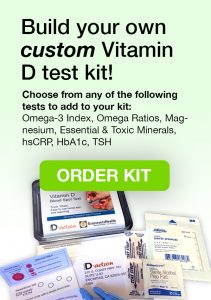
Did you know that each of the above can be measured at home using a simple blood spot test? As part of our ongoing research project, you can order your home blood spot test kit to get your levels, followed by education and steps to take to help you reach your optimal target levels. Start by enrolling and ordering your kit to measure each of the above important markers, and make sure you are getting enough of each to support better mood and wellbeing!
Build your custom kit here – be sure to include your Omega-3 Index (Only or with Ratios), Magnesium plus Essential Elements (Mg+Elements), and hsCRP along with your vitamin D.
